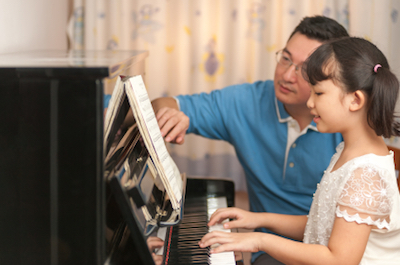Piano lessons can provide numerous benefits for children, both in terms of their intellectual and artistic development. Learning piano should move to the top of your list if you’re looking for a fun activity with lifetime rewards. It provides many benefits, including:
Improved cognitive development: Learning to play the piano requires a great deal of focus and concentration, which can help children develop their cognitive abilities. In particular, piano lessons can improve children’s problem-solving skills, memory, and hand-eye coordination.
Greater creativity: Playing the piano allows children to express themselves creatively and explore their own musical ideas. Children develop a greater appreciation for the creative process and gain confidence in their artistic abilities as they learn to play different pieces and compose their music.
Increased self-discipline: Piano lessons can be challenging and require a great deal of practice. Through piano lessons, children learn the importance of discipline and setting goals for themselves, which can benefit them in all areas of their lives.
Enhanced math skills: Playing the piano involves understanding and working with fractions, intervals, and other mathematical concepts. By studying piano, children can improve their math skills, which can benefit them in the future.
Improved language skills: Music is a language in itself, as piano students learn musical notation to communicate musical ideas and express emotions. Also, children may improve their language skills because of the connection between music and language.
Boosted social skills: Playing piano with others, whether in a group lesson or a recital, helps children to learn how to work and communicate with others. This can be beneficial in developing social skills.
Increased self-esteem: As children learn to play the piano, they gain a sense of accomplishment and pride in their abilities. This can lead to increased self-esteem. Through consistent practice and progress, children will learn that they can achieve great things with hard work and dedication.
Need even more? Piano lessons provide many other benefits to children, including increased patience and perseverance, better study habits, and increased cultural knowledge.
Taking piano lessons can be an excellent investment for children’s overall development. If it’s on your to-do list for this year, find a skilled and experienced piano teacher who can guide your child through the learning process, and make it fun and enjoyable.



